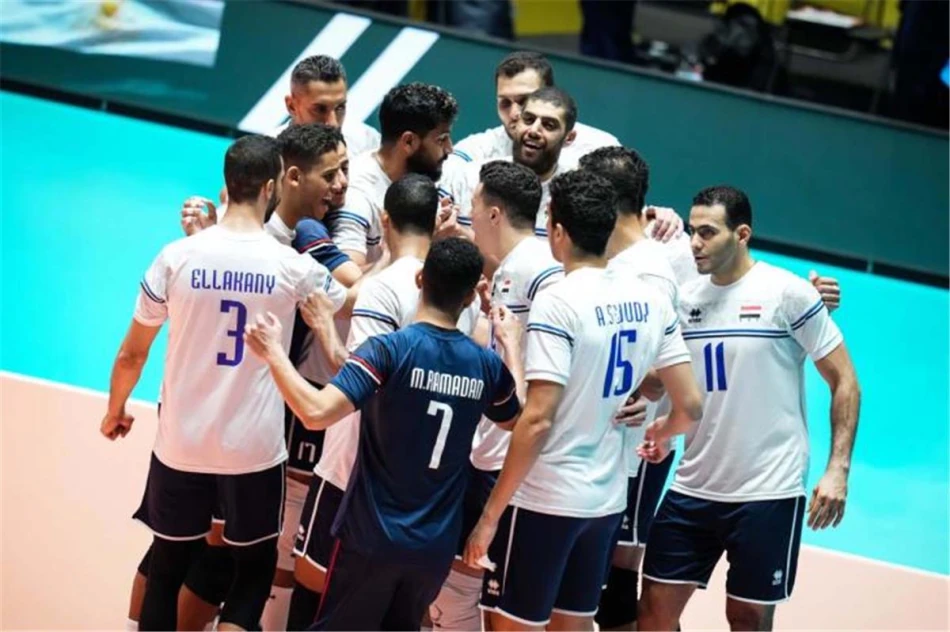
Egypt Triumphs Over Iran in Volleyball World Championship
Egypt's Volleyball Pharaohs Strike Gold in World Championship Opener Against Iran
Egypt's national volleyball team delivered a commanding 3-1 victory over Iran in their opening match of the FIVB Volleyball Men's World Championship in the Philippines, signaling their serious intent to make a deep tournament run. The Pharaohs' convincing performance positions them as strong contenders in Group 1, alongside fellow Arab nation Tunisia, who also secured an opening-day victory.
Dominant Display Sets Championship Tone
The Egyptian squad showcased tactical superiority and mental resilience, winning with set scores of 25-17, 16-25, 25-23, and 25-20. Despite dropping the second set, Egypt's ability to bounce back and close out the match demonstrates the kind of championship composure that separates contenders from pretenders in global competitions.
Iran, traditionally a formidable volleyball nation in Asian competitions, found themselves outmaneuvered by Egypt's strategic approach. The victory represents more than just three points in the group standings—it establishes Egypt as a legitimate threat to advance from what many considered a competitive pool.
Arab Nations Show Mixed Fortunes on Opening Day
The broader Arab representation at the World Championship painted a tale of contrasts. While Egypt and Tunisia celebrated victories, other regional teams faced setbacks that could define their tournament trajectories.
Tunisia's Perfect Start
Tunisia delivered an even more emphatic statement with a straight-sets 3-0 victory over host nation Philippines, creating an intriguing dynamic within Group 1. The North African side's dominant performance suggests the group's top two qualifying spots may well be contested between the Arab neighbors, leaving Iran and the Philippines fighting for scraps.
Setbacks for Qatar and Libya
Qatar's 1-3 defeat to Netherlands and Libya's identical scoreline loss to Canada highlight the gulf in volleyball infrastructure and development between different Arab nations. These results underscore how Egypt and Tunisia have emerged as the region's volleyball powerhouses, investing significantly in professional leagues and international exposure for their players.
Global Competition Heats Up Across Groups
Beyond the Arab nations' performances, the opening day revealed several compelling storylines across the tournament's eight groups.
Argentina's thrilling five-set victory over Finland (3-2) demonstrated the South American giants' resilience, while France's clinical 3-0 dismantling of South Korea served notice of their championship ambitions. The French performance, with dominant set scores of 25-12, 25-18, and 25-16, suggests they've successfully rebuilt following recent international disappointments.
Belgium's comfortable 3-0 victory over Ukraine and Czech Republic's straight-sets triumph against Serbia indicate that European volleyball's depth continues to strengthen, potentially setting up fascinating knockout-round matchups.
Strategic Implications for Tournament Progression
Egypt's victory carries significant weight beyond the immediate result. In World Championship format, where only the top two teams from each group advance to the knockout rounds, securing early victories against direct competitors proves crucial.
The Pharaohs now control their destiny in Group 1, knowing that maintaining their form against Tunisia and the Philippines should secure advancement. More importantly, finishing first in the group could provide a more favorable knockout-round draw, potentially avoiding volleyball superpowers until later stages.
For volleyball analysts and fans, Egypt's performance suggests the global game's competitive balance continues shifting. Traditional powerhouses can no longer assume easy victories against emerging nations that have invested strategically in player development and coaching expertise.
Looking Ahead: Championship Dark Horses Emerge
Egypt's opening victory positions them as potential dark horses in a tournament where established hierarchies face constant challenges. Their blend of technical skill and tactical awareness, evidenced in the Iran victory, could trouble higher-ranked opponents if they maintain this standard.
The championship's group stage will continue revealing which nations have genuinely improved their volleyball programs and which remain stuck in previous cycles. For Egypt, the Iran victory represents validation of their long-term development strategy—now they must prove it wasn't a one-match anomaly.
Most Viewed News

 Sara Khaled
Sara Khaled






